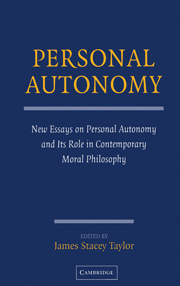Book contents
- Frontmatter
- Contents
- List of Contributors
- Acknowledgments
- Introduction
- PART I THEORETICAL APPROACHES TO PERSONAL AUTONOMY
- 1 Planning Agency, Autonomous Agency
- 2 Autonomy without Free Will
- 3 Autonomy and the Paradox of Self-Creation: Infinite Regresses, Finite Selves, and the Limits of Authenticity
- 4 Agnostic Autonomism Revisited
- 5 Feminist Intuitions and the Normative Substance of Autonomy
- 6 Autonomy and Personal Integration
- 7 Responsibility, Applied Ethics, and Complex Autonomy Theories
- PART II AUTONOMY, FREEDOM, AND MORAL RESPONSIBILITY
- PART III THE EXPANDING ROLE OF PERSONAL AUTONOMY
- Index
5 - Feminist Intuitions and the Normative Substance of Autonomy
Published online by Cambridge University Press: 03 December 2009
- Frontmatter
- Contents
- List of Contributors
- Acknowledgments
- Introduction
- PART I THEORETICAL APPROACHES TO PERSONAL AUTONOMY
- 1 Planning Agency, Autonomous Agency
- 2 Autonomy without Free Will
- 3 Autonomy and the Paradox of Self-Creation: Infinite Regresses, Finite Selves, and the Limits of Authenticity
- 4 Agnostic Autonomism Revisited
- 5 Feminist Intuitions and the Normative Substance of Autonomy
- 6 Autonomy and Personal Integration
- 7 Responsibility, Applied Ethics, and Complex Autonomy Theories
- PART II AUTONOMY, FREEDOM, AND MORAL RESPONSIBILITY
- PART III THE EXPANDING ROLE OF PERSONAL AUTONOMY
- Index
Summary
The concept of personal autonomy has become a matter of considerable contention among feminists. For quite some time, many feminists disowned the concept for purposes of ethical and social theory, arguing that the notion of personal autonomy harbors dangerous masculinist implications. However, over the past decade it has become clear that autonomy is too useful for both critical and constructive purposes for feminists to abandon the concept altogether. If autonomous agency is intuitively a matter of claiming ownership of what one does and one's reasons for doing it, then some conception of autonomy, suitably “refigured,” would seem to be indispensable for feminist projects of personal, institutional, and social critique and transformation.
Among feminists seeking to reconceive autonomous agency, there has arisen considerable contention about how normatively robust a conception of autonomy must be to underwrite feminist projects of ethical and social criticism and reconstruction. This has come at a time when the issue of autonomy's normative content has also been the subject of much debate among a wider circle of theorists. To put the matter (too) simply, some feminists argue that only a conception of autonomy that incorporates substantive normative commitments can adequately explain how oppressive modes of gender socialization can impair women's and men's autonomy. Other feminists argue that such substantive accounts of autonomy are intolerably restrictive because they clash with the fundamental conviction that autonomous agents must be self-directing or self-ruling in a manner that leaves them free to adopt or act upon normative commitments other than those that substantive theories prescribe.
- Type
- Chapter
- Information
- Personal AutonomyNew Essays on Personal Autonomy and its Role in Contemporary Moral Philosophy, pp. 124 - 142Publisher: Cambridge University PressPrint publication year: 2005
- 33
- Cited by



